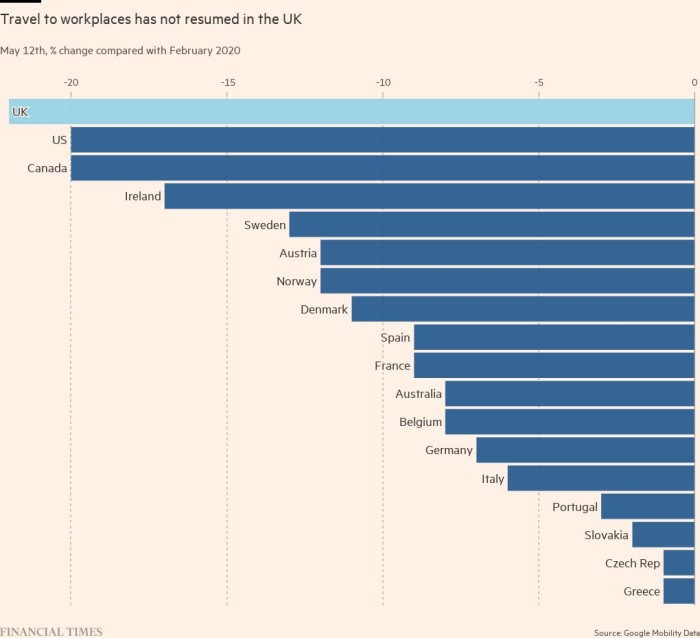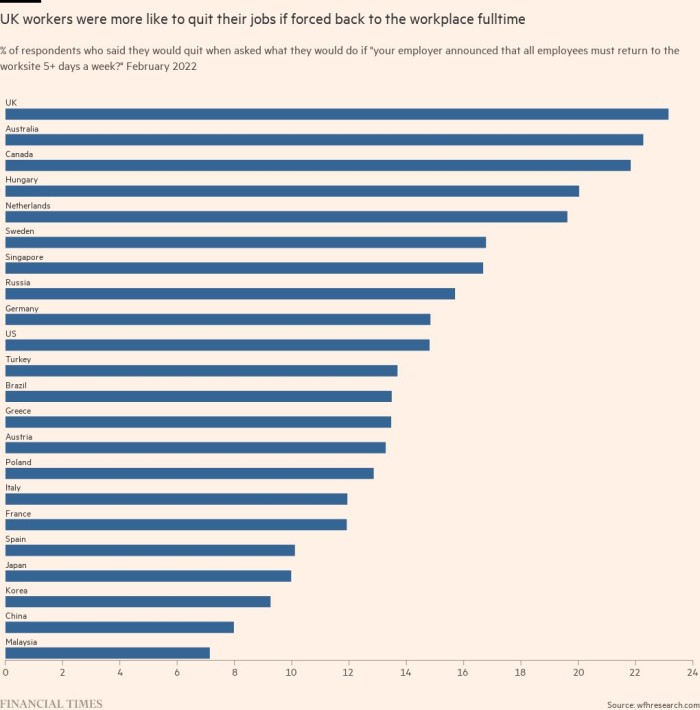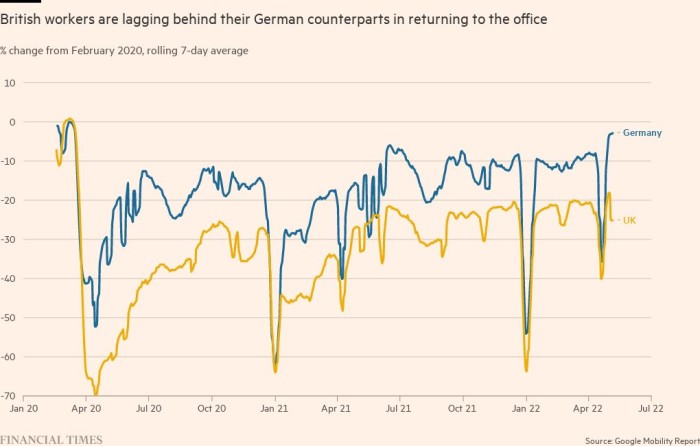The UK’s shift to homeworking has produced it an outlier amid most other advanced economies, in accordance to an FT investigation, as the dimension of its skilled companies sector and far more flexible labour current market are predicted to avert a return to pre-pandemic concentrations of office environment occupancy.
Months immediately after the last Covid limitations have been lifted, the newest accessible info present that commuter quantities are however almost a quarter down on stages noticed in February 2020, before coronavirus took keep in the Uk.
“There has been a long-lasting state of mind shift about how operate is organised amid the UK’s previously office-centered workforce,” explained Jane Parry, affiliate professor in function and work, at the College of Southampton and writer of a latest research on operating methods after the lockdown.
Parry reported that almost all respondents supported some form of flexible doing work, with quite a few expressing that performing from home was more effective not minimum because it lower out the day by day commute to the office.
The hottest Google mobility facts for a Thursday (May 12) — the peak week day for business office working — showed commuter figures were being however far more than 20 for each cent down below pre-pandemic amounts. This is broadly unchanged from previous September, pointing to what could be a new write-up-pandemic norm.

This is much more than double the stages in most other European nations working with the equivalent information, with Germany only 7 for every cent down below pre-pandemic commuter quantities. US and Canadian information are far more related to the Uk but they nevertheless propose a lot more staff have returned to places of work.
Nick Bloom, professor of economics at Stanford College, stated the United kingdom, alongside with the US, had viewed a marked shift in the numbers of persons using a hybrid doing the job product, with homeworking “very rare” just before coronavirus struck. “Post-pandemic, it appears to be as if those people employees are going to perform, on common, two to 3 days a 7 days in the office environment and two to a few times a 7 days at house,” he reported.
A world-wide survey of 33,000 folks in February by WFH Research, a device run by a variety of North American universities, such as Stanford, showed that the Uk experienced the optimum variety of paid working days from household every 7 days in Europe.
It also located that Britons believed homeworking experienced increased their effectiveness a lot more than people in other European nations and that the United kingdom had the greatest share of staff members who explained they would give up if they were being compelled to return to the workplace total time.

Jack Leslie, economist at the Resolution Basis feel-tank said a combination of elements experienced contributed to the clear good results of hybrid or homeworking in the United kingdom, such as a massive proportion of computer system-based mostly jobs. “The British isles is a expert services-centered economy, indicating a bigger share of employment can feasibly be accomplished remotely on a long-lasting foundation,” he stated.
About 80 for each cent of Uk workers in facts and conversation, as properly as nearly two-thirds in specialist and scientific providers, work both from dwelling or use a hybrid model, in accordance to the Place of work for Nationwide Figures. This compares to an ordinary of 28 for every cent throughout all industries.
Commuting time and prices are also commonly bigger in the United kingdom, an essential component at a time when homes are going through the most severe squeeze in residing criteria in decades.
Christopher Pissarides, professor of economics at the London College of Economics, mentioned that an additional cause the British isles was an outlier was the much more flexible and considerably less controlled labour industry in comparison to other European nations.
The discrepancy in between the British isles and some industrial economies, this kind of as Germany and Italy, in conditions of the quantities returning to the place of work has been mostly constant throughout the earlier couple of months.
Pissarides explained he predicted the measurement of the UK’s expert services sector intended the hole with other sophisticated economies with a larger proportion of production positions “should persist.”
Data from Freespace, which tracks workplace use, largely by monitoring the even larger specialist providers firms, observed that British isles occupancy premiums were about 30 for each cent in the 1st week of May, 50 % the price just before the pandemic.

The reluctance to return to the workplace is specifically acute in London, which has a increased focus of professional solutions than somewhere else in the United kingdom. The most up-to-date Google facts reveals that trips to workplaces in the funds ended up down by a lot more than 30 for every cent in contrast with pre-pandemic levels in early May well.
Transport for London figures suggest the dilemma is even much more acute. The quantity of individuals coming by means of the stations in the Metropolis on the very last Thursday in April was near to the maximum ranges considering that the start off of the pandemic but it was even now 42 for each cent down from the degrees before coronavirus hit.
“The value of commuting in phrases of time and income are typically greater in London, and some people today may well however be concerned about making use of public transport, which is the key kind of commuting in London,” said Yael Selfin, an economist at KPMG.
Pissarides claimed he considered the technological and organisational changes manufactured by companies to enable their employees to operate from house had served deliver about a everlasting adjust for a lot of Uk staff. “I think hybrid doing work is in this article to stay.”
*This write-up has been current with the most new Google mobility facts
